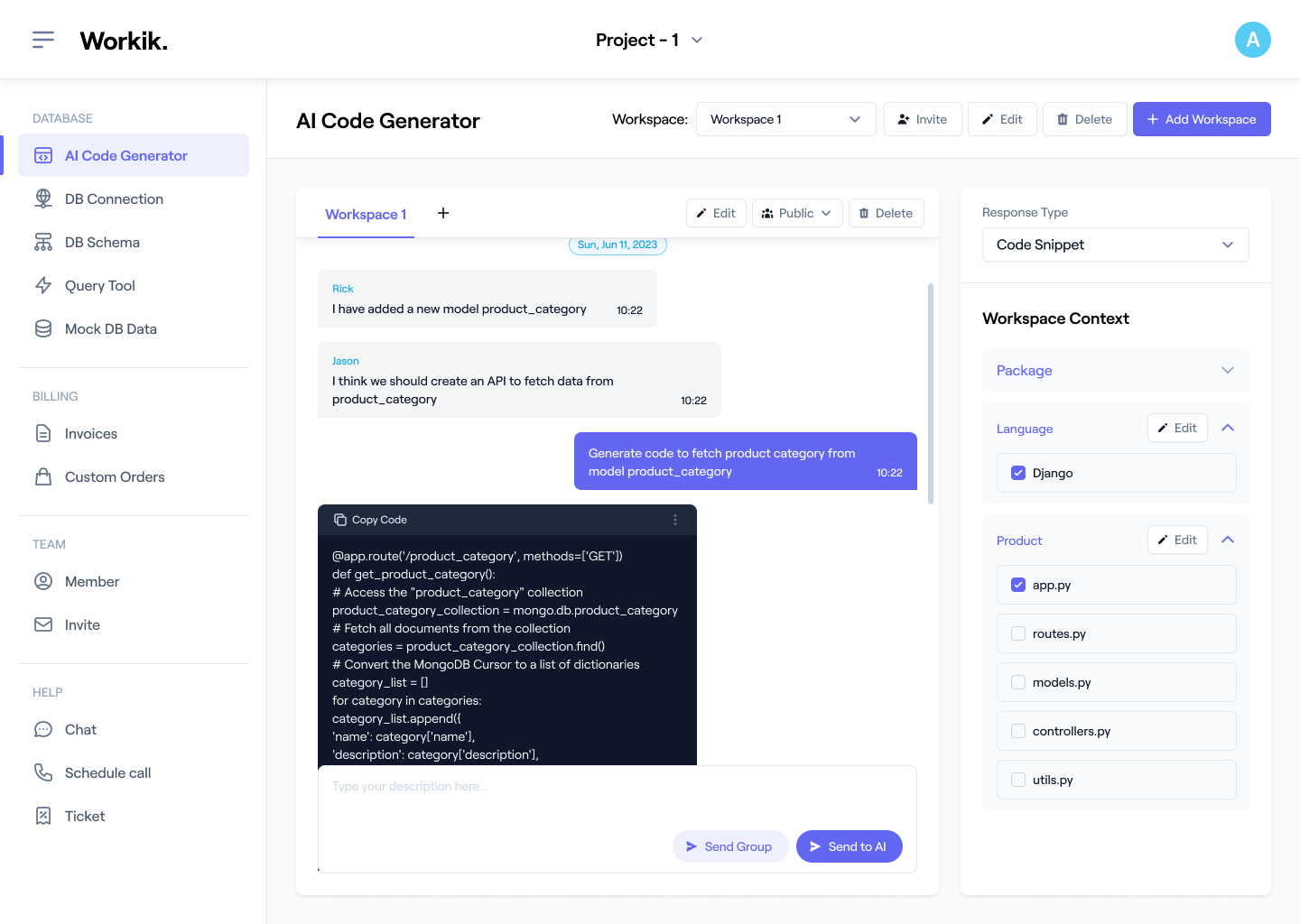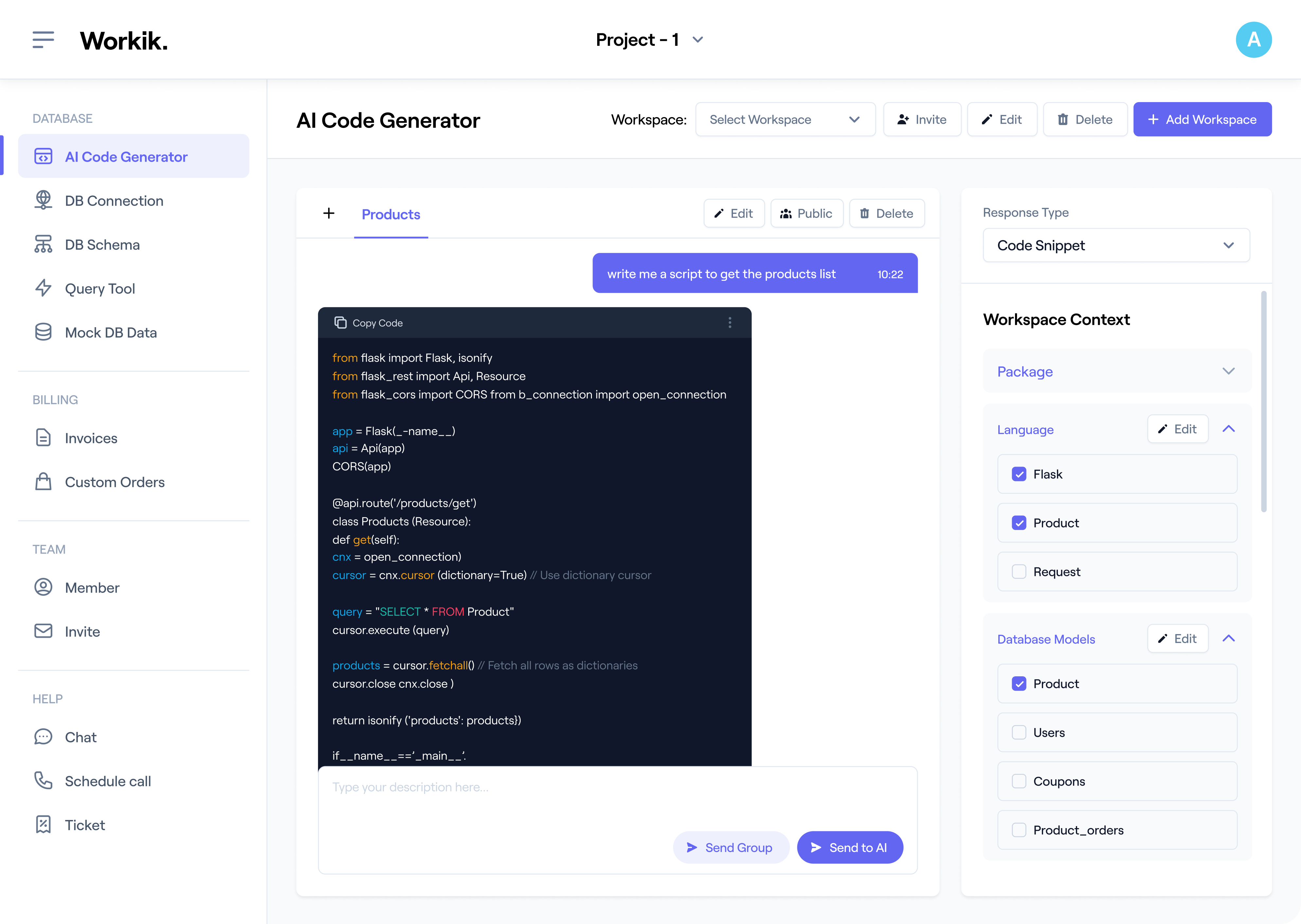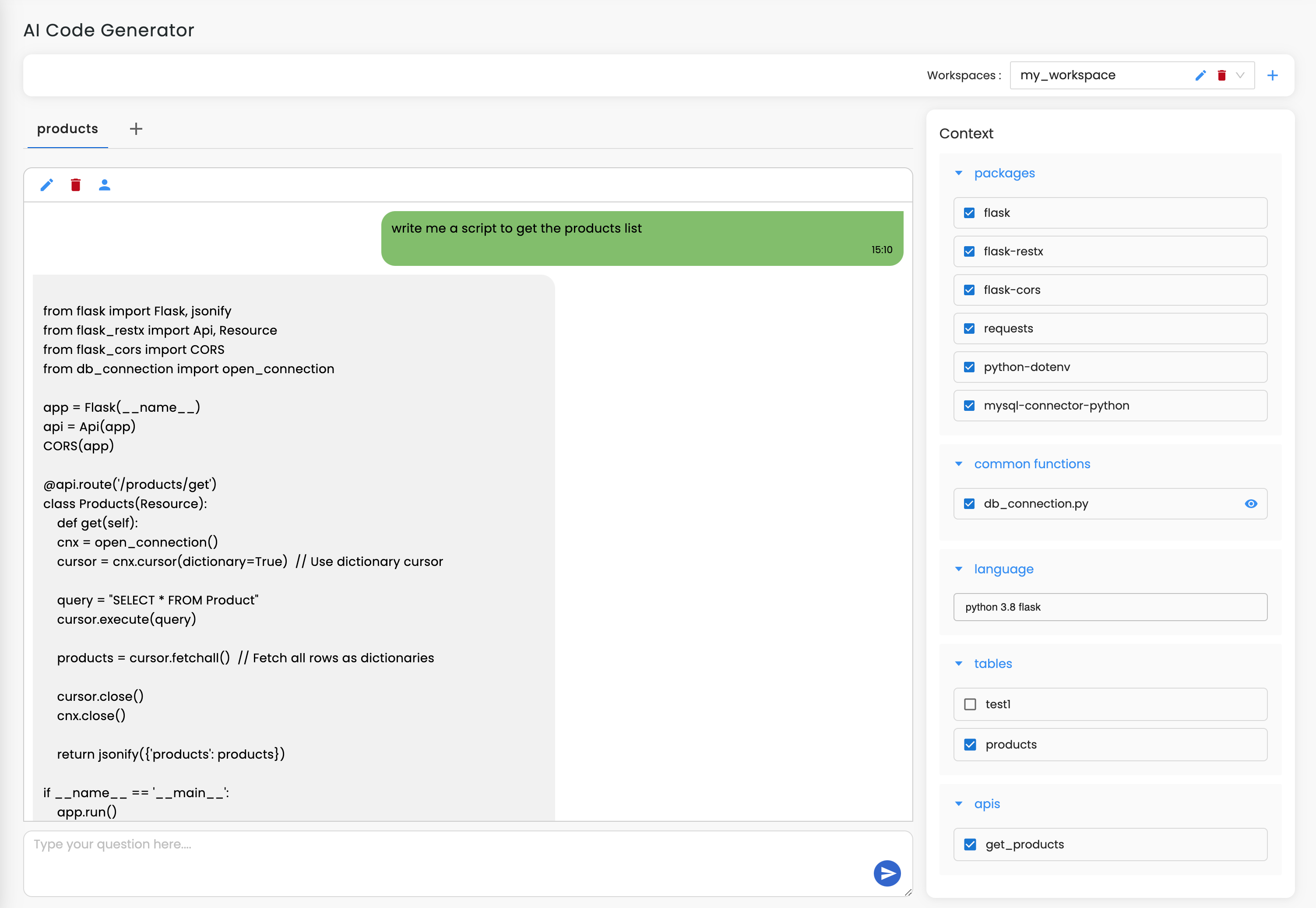
Join our community to see how developers are using Workik AI everyday.
Features

Generate Secure JWTs
Use AI to create robust tokens with HS256 and RS256, optimized for frameworks like Node.js, Django, and more.

Validate and Decode JWTs
AI verifies token signatures and decodes claims to secure communication in Spring Boot, Flask, and microservices.

Implement Role-Based Access Control
AI encodes roles and permissions into JWT claims effortlessly, simplifying RBAC for React.js, Angular, and FastAPI.

Automate Token Lifecycle
AI manages token expiration, renewal, and revocation, ensuring smooth session handling and secure API interactions.
How it works
Create a Workik account in seconds and start generating and validating JWTs with AI-powered tools.
Import existing codebases from GitHub, GitLab, or Bitbucket. Define signing algorithms like HS256, RS256, and frameworks such as Express.js, Spring Boot, or more to tailor AI assistance.
Leverage AI to create JWTs, validate signatures and claims, and debug issues like mismatched keys or expired tokens effortlessly.
Invite your team to manage token lifecycles collaboratively, implement RBAC, and integrate seamlessly with tools like Postman and API Gateways.


Expand
.png)
.png)
Expand


Expand


Expand


Expand


Expand


Expand


TESTIMONIALS
Real Stories, Real Results with Workik
Workik simplified token validation for our APIs. The AI-assisted debugging saved hours of troubleshooting!

Arman Carter
Backend Developer
Integrating JWT with Workik’s AI was seamless. Setting up RBAC for our Angular app is now a breeze!

Selvie Jun
Full Stack Developer
Workik’s AI handled our token lifecycle management flawlessly. It’s a must-have for secure microservices communication.

Rakesh Mehta
DevOps Engineer
What are some popular use cases for Workik's AI-powered JWT Token Generator and Validator?


Some popular use cases of the JWT Token Generator and Validator for developers include but are not limited to:
* Secure API authentication with algorithms like HS256 and RS256.
* Encode roles, permissions, and custom claims for RBAC.
* Enable Single Sign-On (SSO) for seamless multi-platform access.
* Secure inter-service communication in microservices architectures.
* Manage token lifecycle, including expiration and renewal, for session handling.
* Protect APIs against replay attacks by including unique claims.
* Facilitate IoT device authentication with lightweight, secure tokens.
* Validate and decode JWTs for debugging API integrations in Postman or similar tools.
* Ensure compliance with OAuth 2.0 and OpenID Connect for secure authentication workflows.
What kind of contexts can I add in Workik’s AI for the JWT Token Generator and Validator?


Workik allows diverse context-setting options for JWT tasks, such as:
* Sync repositories from GitHub, GitLab, or Bitbucket.
* Define algorithms like HS512, RS512, or ES256 for secure tokens.
* Import API specs from Swagger or Postman.
* Add frameworks like Express.js, Spring Boot, or Django.
* Upload payloads, claims, or keys for signature validation.
* Incorporate database schemas for context-aware JWT creation.
* Specify user flows for fine-tuned authentication.
* Add environments like Kubernetes or Docker for automated token handling.
How does Workik handle key rotation for JWTs?


Workik automates key rotation by integrating with secure key management systems. It ensures tokens are signed with the latest private keys while maintaining compatibility with previously issued tokens for verification.
Can Workik help with integrating JWTs into legacy systems?


Yes, Workik’s AI makes it easy to generate JWTs that integrate with legacy systems by supporting flexible payloads and algorithms. It bridges older authentication models with modern, stateless workflows for seamless upgrades.
How does Workik simplify token usage in serverless applications?


Workik automates token creation and validation for serverless frameworks like AWS Lambda or Google Cloud Functions, ensuring secure API communication without the overhead of managing sessions.
How does Workik optimize token usage for high-traffic systems?


Workik uses AI to optimize token structures and payload sizes, ensuring they are lightweight and efficient for high-traffic systems, reducing latency in APIs handling millions of requests.
Can Workik integrate with third-party monitoring tools for JWT?


Yes, Workik can sync with tools like Datadog or New Relic to monitor JWT usage, token validation errors, and expiration patterns, providing valuable insights for scaling applications.
How does Workik assist with JWTs in mobile authentication?


Workik generates and validates tokens optimized for mobile platforms, supporting refresh token workflows and integrating seamlessly with frameworks like React Native or Flutter.
Generate Code For Free

JWT: Question and Answer
JWT (JSON Web Token) is an open standard for securely transmitting information between parties as a JSON object. It is compact, URL-safe, and can be signed using algorithms like HS256 or RS256 to verify authenticity or encrypted for confidentiality. JWTs are commonly used in authentication, authorization, and secure data exchange scenarios.
Popular tools, frameworks, and libraries for JWT development include:
Frameworks:
Express.js, Spring Boot, Flask, Django REST Framework
Token Libraries:
jsonwebtoken (Node.js), pyjwt (Python), jsonwebtoken (Java)
Testing Tools:
Postman, Swagger
Deployment:
Kubernetes, Docker
Encryption:
OpenSSL
Middleware:
Passport.js, Flask-JWT-Extended
JWT is commonly used for but not limited to:
API Authentication:
Secure access to APIs by validating tokens.
Role-Based Access Control (RBAC):
Encode roles and permissions in tokens.
Single Sign-On (SSO):
Authenticate users across multiple platforms.
Microservices Communication:
Enable secure, stateless communication.
Temporary Access Tokens:
Grant short-lived access to secure resources.
IoT Authentication:
Lightweight and efficient token-based authentication for IoT devices.
Mobile App Authentication:
Secure user sessions with refresh tokens.
Career opportunities and technical roles available for JWT professionals include Backend Developer, Full-Stack Developer, DevOps Engineer, Security Engineer, Microservices Architect, and IoT Engineer.
Workik AI can automate key JWT tasks, such as:
Token Generation:
Create secure tokens with custom payloads, claims, and algorithms.
Validation and Debugging:
Validate signatures and debug mismatched claims or expired tokens.
RBAC Setup:
Encode roles and permissions for seamless API workflows.
API Integration:
Automate token validation in API endpoints.
Lifecycle Management:
Handle expiration, renewal, and revocation effortlessly.
Microservices Security:
Generate lightweight tokens for stateless communication.
Optimization:
Reduce token size for faster processing in high-traffic systems.
Refactoring:
Enhance JWT workflows for better performance and scalability.
Testing:
Simulate token workflows to ensure security and reliability.
Documentation:
Generate comprehensive docs for JWT headers, payloads, and claims.
Explore more on Workik
Get in touch
Don't miss any updates of our product.
© Workik Inc. 2026 All rights reserved.

